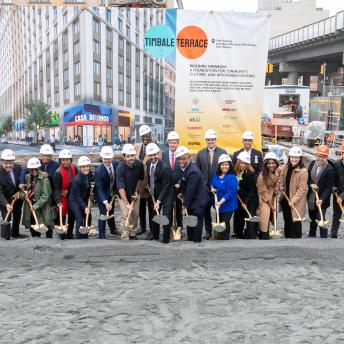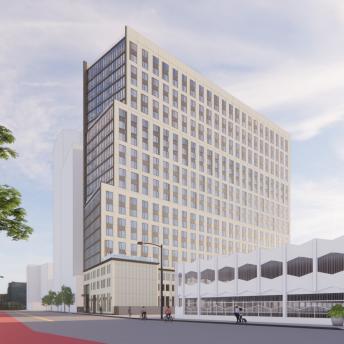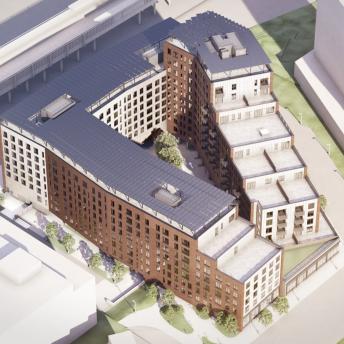NEW YORK – New York City Mayor Eric Adams today announced a new pilot program to help tenants in affordable housing developments report on-time rental payments to major credit bureaus, in an effort to strengthen their credit scores. The free program — an effort by the New York City Department of Housing Preservation and Development (HPD), the New York City Housing Development Corporation (HDC), and rent reporting platform Esusu — will allow eligible tenants in select HPD- and HDC-financed affordable housing developments to opt in to having their rent payments reflected in their credit scores. The pilot — launched in June 2025 and which will run for 15 months — is expected to reach about 500 households. The initiative is a key component of Mayor Adams’ “City of Yes for Families” plan, first unveiled in his State of the City address earlier this year, as well as the “Where We Live” fair housing plan for New York City, to help more families achieve homeownership. Today’s pilot program follows Mayor Adams’ announcement earlier this year that the his administration is doubling the city’s investment in the HomeFirst Down Payment Assistance Program, to provide even more qualified first-time homebuyers with up to $100,000 toward the down payment or closing costs of a one-to-four family home, a condominium, or a co-op in the five boroughs.
“We shattered affordable housing records two years in a row, passed landmark zoning changes to build tens of thousands of new homes, and invested historic amounts of funding in new housing through our budget. There’s no other way to say it: we are the most pro-housing administration in New York City history — full stop,” said Mayor Adams. “Unfortunately, too many of our city’s residents, especially Black and Brown New Yorkers, are still struggling to make the jump from renter to homeowner and build generational wealth. If you’re paying rent on time every month, you should see that reflected in your credit score, and with this program, we will help make that a reality. We will unlock the promise of homeownership for more New Yorkers and double down on our efforts to make New York a more affordable city that is the best place to raise a family.”
“From day one, our administration has committed to supporting New Yorkers’ ability to achieve financial stability and avail themselves of opportunity,” said Deputy Mayor for Housing, Economic Development, and Workforce Adolfo Carrion, Jr. “This commonsense pilot will allow renters to enjoy the benefits of their financial responsibility, helping New Yorkers to build their credit scores and achieve their dream of homeownership.”
“Rent is often an individual or family’s largest monthly expense — and it’s absurd that, for so long, the payments being made never counted toward building credit,” said HPD Acting Commissioner Ahmed Tigani. “Today, we’re taking an important step towards addressing this issue. This pilot is about fairness and about financial opportunity and builds on our efforts to expand access to homeownership for New Yorkers. If you pay your rent, you should see your credit go up. And now, for those who are a part of this incredible pilot, it will. Thank you to our partners, in and out of government, for helping us reach this important milestone.”
“Traditional methods of calculating credit scores have contributed to barriers faced by low-income households when seeking a safe, stable, and affordable home — further perpetuating cycles of poverty and inequality,” said HDC President Eric Enderlin. “As we continue our efforts to expand access to New York City’s affordable housing supply, we are proud to partner with our colleagues at HPD to deliver solutions that will further strengthen residents’ financial well-being and promote economic mobility for New Yorkers citywide.”
Credit scores play an essential role in determining one’s financial future, with higher credit scores often unlocking lower premiums for home and car insurance, lower interest rates on mortgages, and more. Unfortunately, rental payments do not currently count towards one’s credit score. Across the country and here in New York City, this practice has excluded renters — particularly Black and Brown New Yorkers who are more likely to rent their homes than other demographics — from building up their credit scores, despite years of responsible financial behavior, and ultimately achieving homeownership. To date, Esusu has helped renters establish 200,000+ new credit scores and unlock over $50 billion in capital through new credit tradelines. With an average credit score increase of 45+ points, residents of Esusu-enrolled buildings have accessed $30 billion in mortgages, $2 billion in student loans, and over $9 billion in auto loans.
Rent reporting offers a practical, proven solution to this issue. The pilot will launch in select HPD- and HDC-financed affordable housing developments with a high proportion of low-income tenants. Following an initial three-month outreach period, beginning this month, eligible tenants who enroll can have their rent payments reported for 12 consecutive months, from September 2025 to September 2026, through Esusu. Following the completion of this pilot program, the city will evaluate the results for potential future expansion citywide.
Today’s pilot program follows Mayor Adams’ commitment to help more New Yorkers purchase their first home and build generational wealth as part of his City of Yes for Families strategy. The Adams administration has doubled the city’s investment in the HomeFirst Down Payment Assistance Program to provide even more qualified first-time homebuyers with up to $100,000 toward the down payment or closing costs of a one-to-four family home, a condominium, or a co-op in the five boroughs. Mayor Adams also announced multiple new tools, including a $4 million state grant, to help New York City homeowners create accessory dwelling units that will not only help older adults afford to remain in the communities they call home but also help build generational wealth. In addition to creating more housing opportunities, the Adams administration is actively working to strengthen tenant protections and support homeowners. The Partners in Preservation program was expanded citywide in 2024 through an $11 million investment in local organizations to support tenant organizing and combat harassment in rent-regulated housing. The Homeowner Help Desk, a trusted one-stop shop for low-income homeowners to receive financial and legal counseling from local organizations, was also expanded citywide in 2024 with a $9.85 million funding commitment.
Today’s announcement also fulfills a key commitment in Mayor Adams’ “Housing Our Neighbors: A Blueprint for Housing and Homelessness” plan. The blueprint, released in 2022, laid out five key housing pillars for tackling the city’s affordable housing crisis and getting New Yorkers into the safe, high-quality, affordable homes they deserve. As part of that plan, Mayor Adams’ committed to developing a rent reporting pilot to help communities build wealth and achieve homeownership.
“Esusu is proud to partner with HPD and HDC to create transformative, credit-building opportunities for renters in New York, helping them work towards financial equity and ultimately generational wealth,” said Samir Goel and Wemimo Abbey, co-founders and co-CEOs, Esusu. “Families using the Esusu platform gain access to a hand-picked list of services and programs focused on fostering economic mobility and wealth creation. Together, Esusu and HPD will continue building solutions to create positive housing outcomes for low-income families across New York.”
“In a high-cost city like New York, affordable housing is a vital public resource, a place for low- and moderate-income families to experience housing stability,” said Baaba Halm, interim co-president of Solutions Division and senior vice president of programs, Enterprise Community Partners. “However, we must also be doing more to make it a place where wealth-building and access to economic opportunity is a priority. Through Enterprise’s Rent to Build Credit pilot, we explored the promising potential for rent payments to improve credit scores, and we are thrilled to see our partners at HPD take this concept further.”
Since entering office, Mayor Adams has made historic investments toward creating affordable housing and ensuring more New Yorkers have a place to call home. In addition to keeping more New Yorkers in the homes they already have, Mayor Adams is working to build more homes as well. The Adams administration is advancing several robust neighborhood plans that, if adopted, would deliver more than 50,000 units over the next 15 years to New York neighborhoods. In addition to the Bronx-Metro North Station Area Plan and the Atlantic Avenue Mixed-Use Plan, both of which have been passed by the New York City Council, the Adams administration is advancing plans in Midtown South in Manhattan, as well as Jamaica and Long Island City in Queens. Moreover, last December, Mayor Adams celebrated the passage of “City of Yes for Housing Opportunity,” the most pro-housing proposal in city history that will build 80,000 new homes over 15 years and invest $5 billion towards critical infrastructure updates and housing. Last June, City Hall and the City Council agreed to an on-time, balanced, and fiscally-responsible $112.4 billion Fiscal Year (FY) 2025 Adopted Budget that invested $2 billion in capital funds across FY25 and FY26 to HPD and the New York City Housing Authority’s capital budgets. In total, the Adams administration has committed $24.5 billion in housing capital in the current 10-year plan as the city faces a generational housing crisis. Mayor Adams celebrated back-to-back record breaking fiscal years, as well as back-to-back calendar years in both creating and connecting New Yorkers to affordable housing. Last spring, the city celebrated the largest 100 percent affordable housing project in 40 years with the Willets Point transformation.
Finally, Mayor Adams and members of his administration successfully advocated for new tools in the 2024 New York state budget that will spur the creation of urgently needed housing. These tools include a new tax incentive for multifamily rental construction, a tax incentive program to encourage office conversions to create more affordable units, lifting the arbitrary “floor-to-area ratio” cap that held back affordable housing production in certain high-demand areas of the city, and the ability to create a pilot program to legalize and make safe basement apartments.



